
O Instituto Igarapé utiliza cookies e outras tecnologias semelhantes para melhorar a sua experiência, de acordo com a nossa Política de Privacidade e nossos Termos de Uso e, ao continuar navegando, você concorda com essas condições.

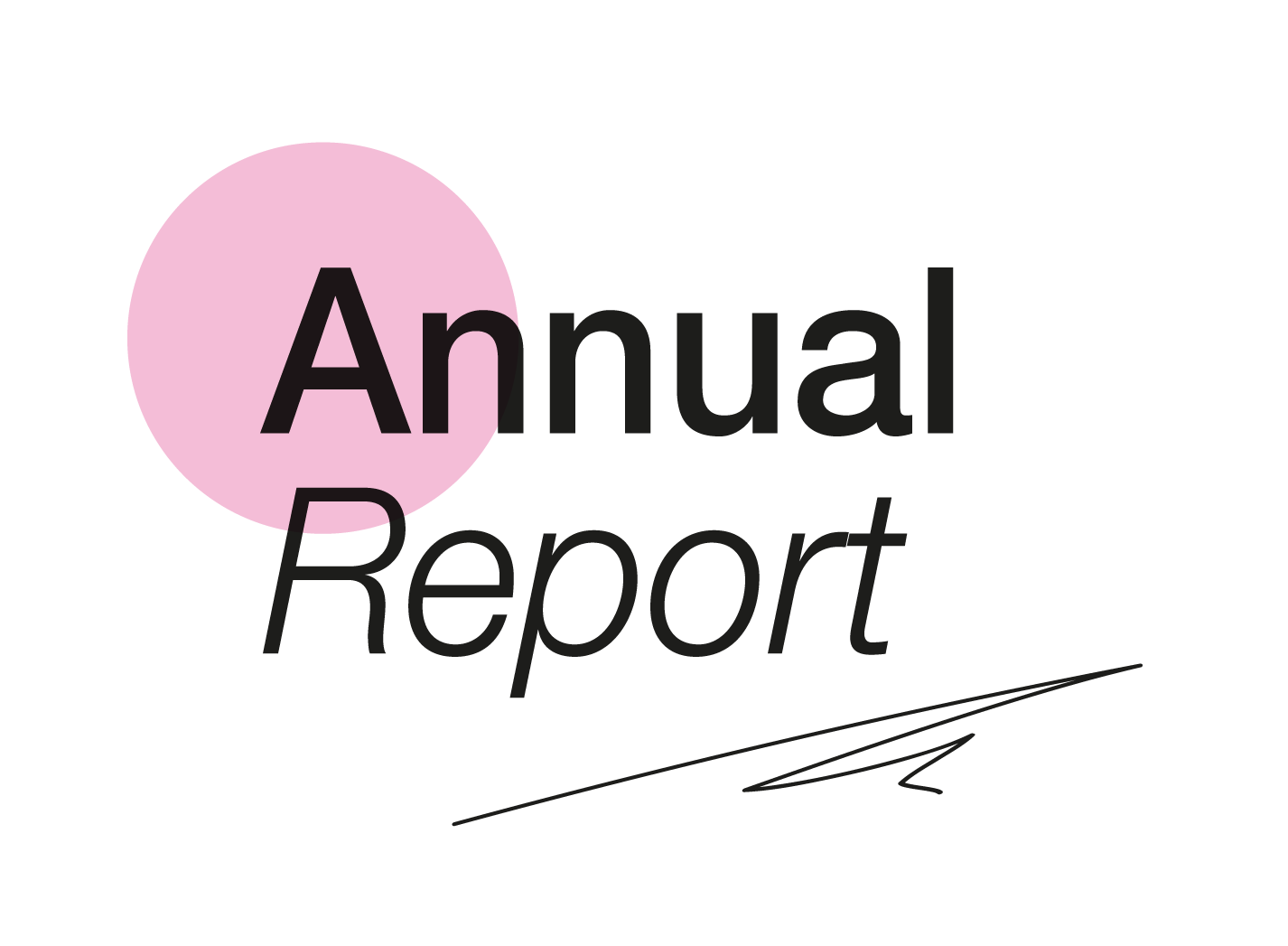
produced by Artificial Intelligence
In 2024, the Igarapé Institute reaffirmed its leadership in advancing solutions to public, digital, and climate security challenges. The organization consolidated its role as a key voice in global policy discussions and expanded its work in areas such as a fair and green economic transition, reducing territorial risks, scaling nature-based solutions, and improving access to financing.
We brought our agenda to high-level strategic forums such as Davos, the COPs, the United Nations, and the G20, focusing on the bioeconomy, climate finance, and the protection of the Amazon. Throughout the year, we continued to engage and inform leaders across sectors, using evidence to help navigate complex challenges and position Brazil and the Global South as hubs for bold, practical solutions.
This interactive, condensed version of our 2024 Annual Report offers a dynamic alternative to the traditional full-length PDF.
We are deeply thankful to all our partners and collaborators who made these accomplishments possible, and renew our invitation to move forward together. The road ahead is challenging, but with purpose and collaboration, we believe meaningful progress is not only possible but inevitable.

We started the year at the World Economic Forum (Davos), where we participated for the sixth time. Ilona Szabó, the Institute’s President, and Robert Muggah, Chief Innovation Officer (CIO), served as moderators and speakers on panels addressing topics aligned with Igarapé’s core themes, strengthening our contribution to global governance and sustainability debates.
We held the 1st Brazilian Forum on Climate Finance in São Paulo, in partnership with the Arapyaú Institute, Aya Institute, Climate and Society Institute, Itaúsa Institute, Open Society Foundations (OSF), and Uma Concertação pela Amazônia. The agenda emphasized the need for concrete action in climate finance to ensure Brazil’s successful leadership in the G20, reinforcing the country’s prominent role in the sustainable finance agenda.
We organized the 2nd Regional Meeting in Brasília, in partnership with the Brazilian Federal Police, with the goal of fostering dialogue and developing strategies to combat environmental crimes in the Amazon Basin. We also launched the study “Violence Against Women in the Legal Amazon in the Last Five Years,” along with reports on the situation in Brazil, Mexico, and Colombia, as well as the data platform “Women in the Amazon: Conflict and Violence,” highlighting the challenges faced by women across the Amazon Basin.
We participated in the panel “Effective Coordination Between Justice and Security Institutions and Civil Society to Combat Organized Crime,” held in Panama by the European Union’s Cooperation Program Against Transnational Organized Crime (EL PAcCTO), with Igarapé Institute represented by its Research Director, Melina Risso.
In partnership with New America, we launched the guide Responsible and Safe AI: A Primer for Policymakers in the Global South, which offers practical recommendations to support leaders and policymakers in the Global South in addressing the challenges of AI implementation, governance, and security.
We held a strategic meeting in Italy at the Rockefeller Foundation’s Bellagio Center, in partnership with the Arapyaú Institute, bringing together 20 key leaders from philanthropy, civil society, the public and private sectors, and financial institutions. The initiative marked the first step in developing the Green Bridge Facility, our effort to reduce territorial risks and boost green enterprises with a positive impact for people and the planet.
In partnership with the IDB, we launched the report Reimagining the Bioeconomy for the Amazon, which examines the bioeconomy across all eight Amazonian countries and highlights opportunities to create sustainable economic alternatives that benefit the region’s nearly 50 million inhabitants. Also in June, Ilona Szabó participated as a panelist in the session “Boosting the Green Economy and Nature-Based Solutions” during the IDB Invest Sustainability Week, held in Manaus.
We celebrated a historic milestone with the decriminalization by Brazil’s Supreme Federal Court (STF) of the possession of up to 40 grams of cannabis for personal use. The decision represents a victory in the fight for fairer drug policies and was informed, in part, by a Technical Brief published by Igarapé in 2015, which was cited in several justices’ opinions. It also reflects the legacy of our global work on this issue, including the Americas Drug Policy Monitor, which is updated on an annual basis.
We took part in the Brazil Forum UK, held in the United Kingdom, which focuses on topics that can drive positive change in Brazil. On that occasion, we participated in the panel “Public Security: Violence and Deforestation in the Amazon”, where we addressed the fight against environmental crimes. Additionally, in the United Kingdom, we participated in London Climate Action Week for the first time, one of the world’s largest events dedicated to climate crisis solutions. We joined the panel “Enabling a Nature-Positive and Net-Zero Economy,” co-organized by the World Economic Forum and the City of London Corporation.
Ahead of the UN Summit of the Future, we actively participated in the Summit of the Future Action Days. On this occasion, Igarapé co-organized the event “Advancing Global Governance Reform,” moderated by Ilona Szabó and featuring Ambassador Maurício Lyrio, Mr. Zane Dangor, and others. We then closely followed the Summit of the Future, which culminated in the adoption of the Pact for the Future. We were also engaged in G20 discussions, which issued a call to action within the framework of the United Nations.
In parallel, we actively participated in New York Climate Week, where we raised awareness about the impacts of environmental and associated crimes on the Amazon and proposed strategies to transform the current ecosystem of illicit economies into one of green enterprises. Throughout this intense week, we reaffirmed our leadership on topics such as multilateralism, climate governance, and nature-focused finance.
During the COP16 on Biodiversity, held in Cali, we took part in the launch of the report by the International Advisory Panel on Biodiversity Credits (IAPB), of which Ilona Szabó is a member. The document serves as a framework for developing biodiversity credit markets. In addition to this topic, Igarapé led key discussions on territorial risk and resilience, bioeconomy financing, the eradication of environmental crimes, and illegal gold mining in the Amazon.
We participated in the Bloomberg New Economy event, held as part of the B20, joining the panels “Climate-Proofing the Economy,” where we highlighted Brazil’s opportunity to become a green powerhouse through the combination of nature-based solutions, low-carbon agriculture, and renewable energy, and “Reimagining Public-Private Partnerships to Enable Thriving Cities,” which explored how public-private partnerships can help transform cities into more resilient and sustainable spaces.
We participated in the inaugural G20 Social, held ahead of the G20 Leaders’ Summit in Rio de Janeiro. There, we presented key issues in both the Support Group for the Bioeconomy Initiative, which informed the principles presented during the historic G20 meeting at the UN Headquarters, and the T20, the G20’s think tank engagement group, where we serve on the National Council and co-lead the task force on multilateralism.
The growing convergence between climate and biodiversity agendas shaped the key international cooperation and multilateralism forums where the Igarapé Institute was active in 2024. From the World Economic Forum in Davos to COPs 16 and 29, and the G20 Summit in Rio de Janeiro, the Institute further established itself as a key player in advancing global governance, sustainable development, international security, and strategies to dismantle environmental crime ecosystems. Our contributions included participation in the United Nations Chief Executives Board (CEB) in New York, with a focus on transnational organized crime, and the UN Civil Society Conference in Nairobi. We also co-hosted two official events during the Action Days that preceded the Summit of the Future and the signing of the Pact for the Future. Igarapé closely followed the unprecedented holding of the G20 meeting during the UN General Assembly, right after the Summit of the Future. Shortly after, we joined New York Climate Week, where we organized the event “Green Bridge Facility – Scaling Green Enterprises and Social Impact in Brazil and the Amazon Basin”, among other strategic engagements. We also took part in the London Climate Action Week, COP16 on Biodiversity, in Colombia, and COP 29, in Azerbaijan. Within the G20 framework, the Institute joined the Secretariat of Brazil’s T20 National Advisory Council and co-led the task force on strengthening multilateralism and global governance. At the J20, we contributed with perspectives on climate litigation and sustainable development. The Igarapé Institute concluded the year by actively engaging in the parallel agendas to the G20 Leaders’ Summit in Rio de Janeiro, playing a prominent role in the Social G20, a groundbreaking initiative that opened space for civil society to contribute directly to the public policy discussed led by the group’s leadership.
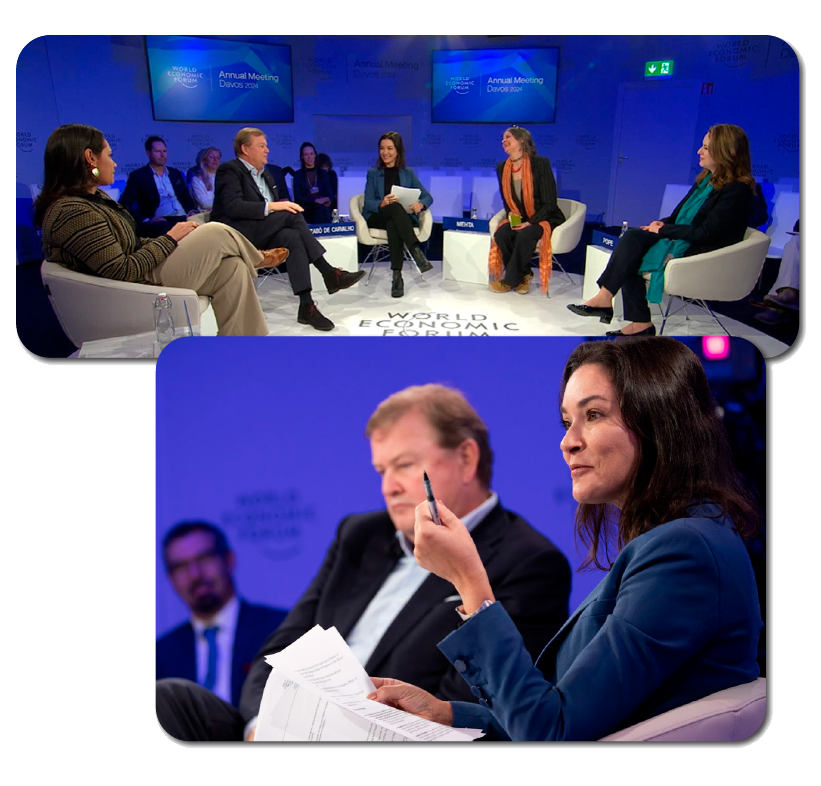

In 2024, we continued advancing efforts to confront environmental crimes and related offenses that heavily impact the Amazon Basin and contribute to climate change. Notable highlights included the publication of the third study in the Follow the Money series, titled Environmental Crimes and Illicit Economic Activities in the Brazilian Amazon Supply Chains, as well as the release of the strategic article Dynamics of the Ecosystem of Environmental Crimes in the Brazilian Legal Amazon. We also provided technical support to two working groups under the National Strategy to Combat Corruption and Money Laundering (Enccla), focused on the timber and cattle supply chains. We delivered several capacity-building initiatives, including the course “Combating Money Laundering and Corruption in Environmental Crimes”, offered in partnership with the Brazilian Association of Environmental Prosecutors (Abrampa), the Ministry of Justice and Public Security, and Rede-Lab, with a focus on environmental prosecutors. In addition, we strengthened engagement with the banking sector by disseminating knowledge and recommendations in strategic forums such as the Anti–Money Laundering Committee of the Brazilian Federation of Banks (Febraban), the National Conference on Environmental Crimes and Money Laundering hosted by Caixa Econômica Federal, and the 8th PLD Experience held by Itaú — reaching more than 1,200 representatives from these institutions.
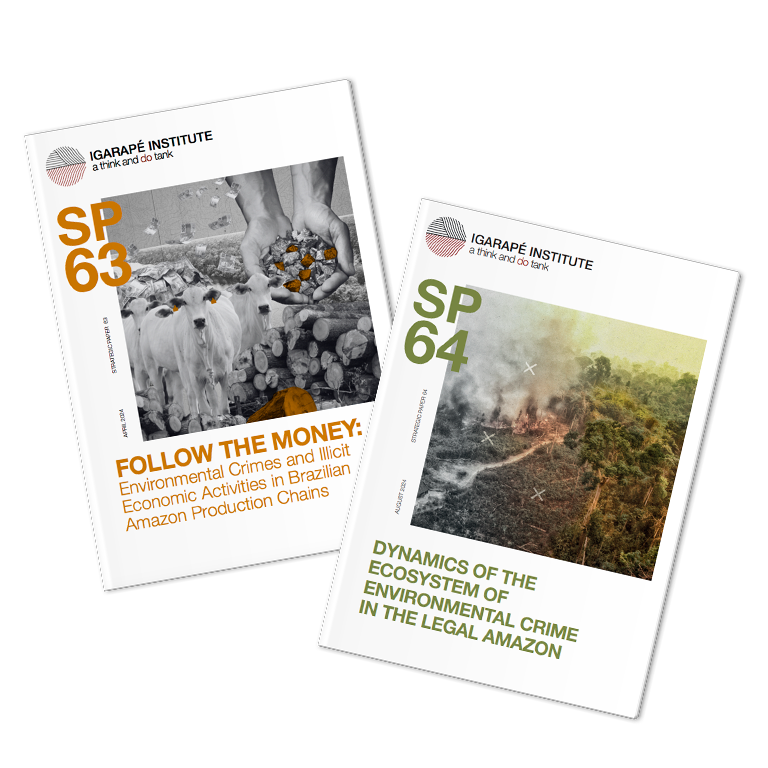

Deepening dialogue and developing strategies to protect the Amazon Basin are essential steps in addressing environmental crimes that threaten the integrity of the forest and the communities that depend on it. In 2024, with the goal of strengthening regional cooperation, coordinated action, and the exchange of best practices, we organized two Regional Meetings. The first, held in partnership with the Brazilian Federal Police, brought together authorities from Amazonian countries to discuss ways to enhance the fight against crimes that lead to deforestation and harm the region’s people and environment. The meeting also led to the definition of shared priorities for joint action. The second meeting, co-hosted with the Financial Action Task Force of Latin America (Gafilat), focused on exchanging experiences and effective methods for preventing money laundering linked to environmental crimes. We also participated in the Brazil-Colombia Binational Meeting on Security and Social and Community Development in Border Regions, held in Tabatinga (Amazonas) — at the tri-border area between Brazil, Colombia, and Peru — as well as the Latin American Networks Meeting on Combating Transnational Organized Crime, held in São Paulo. The year concluded with a high-level meeting in Bolivia, convened in partnership with Wilton Park and the UK Foreign, Commonwealth & Development Office (FCDO). The event assembled government authorities, regional institutions, civil society organizations, and leaders from the technology sector to promote dialogue, foster cooperation, and develop joint solutions. It also helped expand innovative national and regional strategies to tackle environmental and converging crimes in the Amazon, ensuring the protection of this vital ecosystem for future generations.
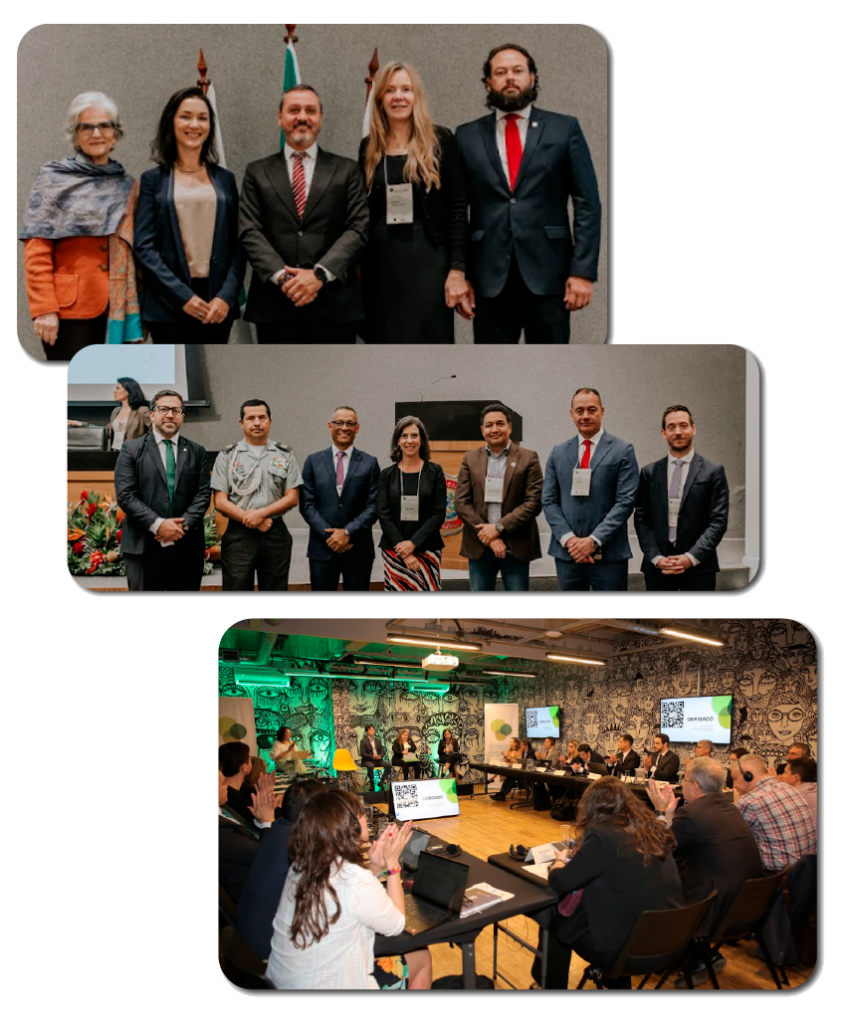

Our efforts to shift illicit economic ecosystems toward green enterprise ecosystems have fostered new partnerships and meaningful contributions toward the development of innovative financing mechanisms for environmental protection and sustainable development. In 2024, we made progress in designing a methodology to identify and mitigate territorial risks, alongside the production of technical inputs, advocacy initiatives, and the organization of strategic events, such as the First Brazilian Forum on Climate Finance. Igarapé also worked on the development and promotion of the Tropical Forests Forever Facility – an innovative mechanism for payments per hectare of preserved forest, announced by the Brazilian government at COP28, with a formal launch expected at COP30. In partnership with the Inter-American Development Bank (IDB), we launched the report Re-imagining Bioeconomy for Amazonia, and participated in the IDB Invest Sustainability Week, held in Manaus. We also hosted a strategic gathering at the Bellagio Center of the Rockefeller Foundation, in collaboration with the Arapyaú Institute. The event convened 20 key leaders from philanthropy, civil society, the public and private sectors, and financial institutions to help structure the Green Bridge Facility (GBF) — an Igarapé Institute initiative designed to reduce territorial risks, unlock responsible investments, and scale high-integrity green enterprises that are capable of establishing themselves, enduring, and thriving in Brazil and across the Amazon Basin.
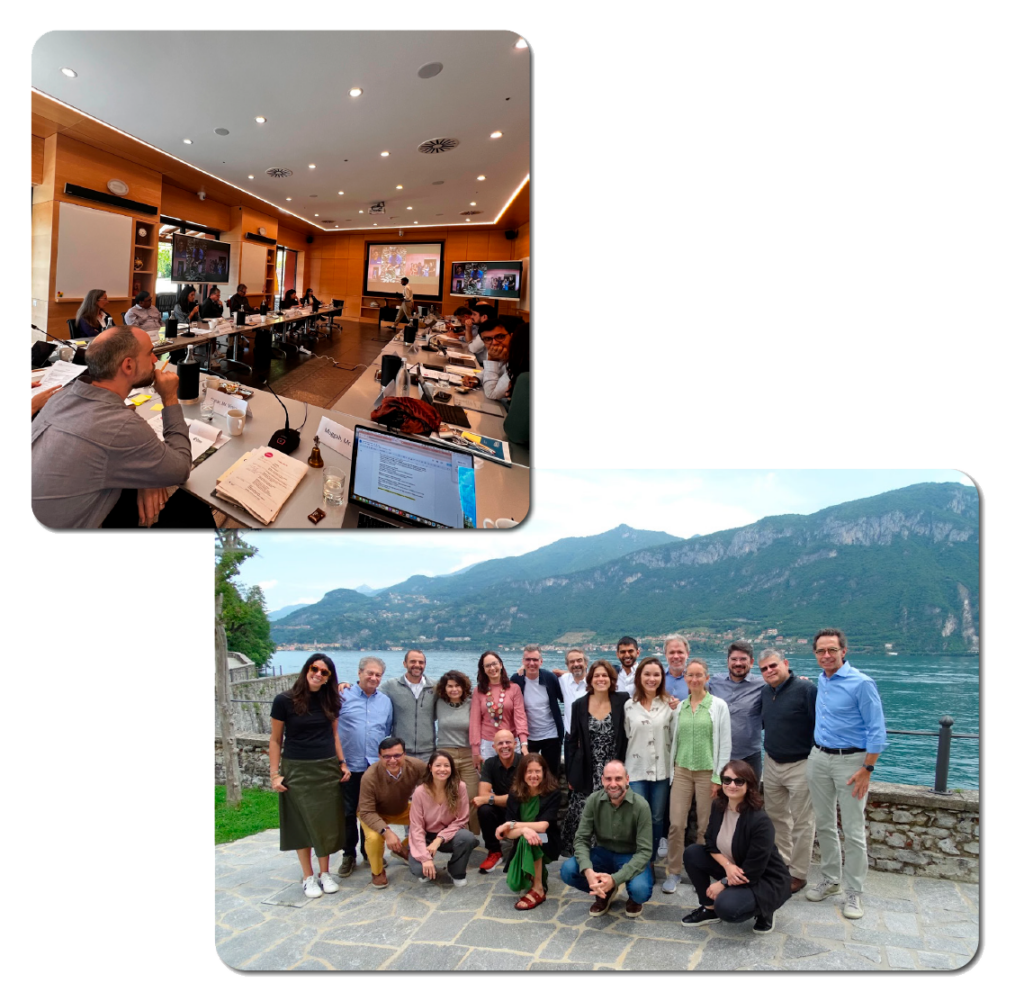

The Igarapé Institute’s initiatives to promote fairer and more effective security policies are centered on protecting women, supporting the social reintegration of formerly incarcerated individuals, monitoring firearms and ammunition policies, and advancing innovative approaches to preventing violence and organized crime. In 2024, we launched a range of studies and guides, and expanded and updated the platforms Women in the Amazon: Conflict and Violence and EVA – Evidence on Violence and Alternatives for Women and Girls, consolidating gender-sensitive data and tools to inform more effective public policies. The Federal Supreme Court (STF) ruling to decriminalize the possession of up to 40 grams of cannabis for personal use was celebrated as a step forward in the fight for more equitable drug policies. It also reinforced the impact and legacy of our work on this issue. We also updated the Americas Drug Policy Monitor, which tracks progress and setbacks in drug policy across the continent, and further strengthened the visibility of the Homicide Monitor, recognized as one of the most comprehensive global databases on the subject, with over 320,000 visits in 2024 alone.
Another key contribution was the launch of research and manuals offering guidance to improve and strengthen public policies aimed at the social inclusion of people exiting the prison system — a historically marginalized population. We also signed a cooperation agreement with the Ministry of Justice and Public Security, through the National Secretariat for Drug Policy and Asset Management (Senad), the National Secretariat for Public Security (Senasp), and the Access to Justice Secretariat (Saju). This partnership enhances data sharing and the monitoring of public security dynamics, with special attention to the states of the Legal Amazon, where public security challenges are compounded by environmental and social pressures.
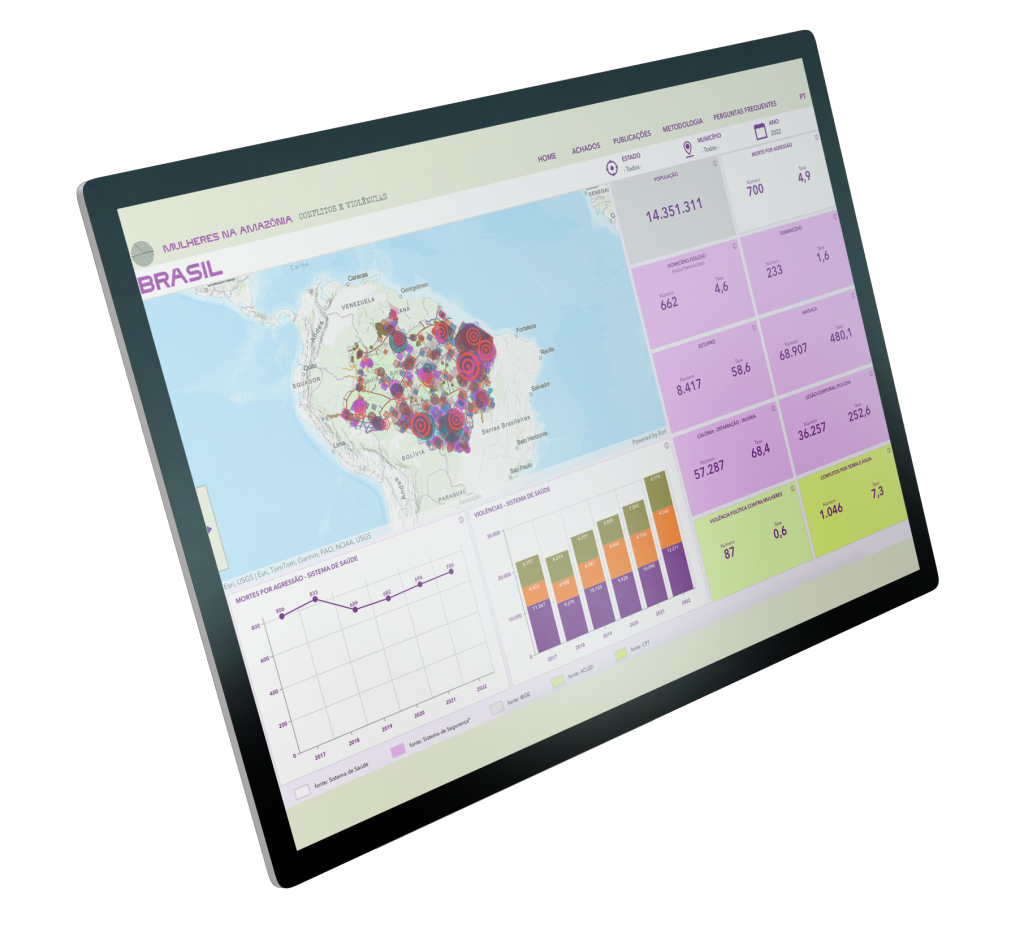

In pursuit of a safer and more citizen-centered digital environment for all, the Igarapé Institute, in partnership with New America, convened experts and human rights advocates through the Global Task Force – Predictive Analytics for Security and Development. Together, they developed practical recommendations to support policymakers and leaders across the Global South in addressing the challenges of implementing, governing, and securing Artificial Intelligence (AI) systems. In addition, we published policy recommendations on the topic as part of the T20 process. Robert Muggah, Igarapé’s Co-Founder and Chief Innovation Officer, participated in the panel “A Digital Future for All: The Digital Hope”, held during the Action Days leading up to the G20 Summit.


Downloads of our publications
Publications
Op-eds
New website visits
Media mentions
Followers across all social media platforms

O Instituto Igarapé utiliza cookies e outras tecnologias semelhantes para melhorar a sua experiência, de acordo com a nossa Política de Privacidade e nossos Termos de Uso e, ao continuar navegando, você concorda com essas condições.

